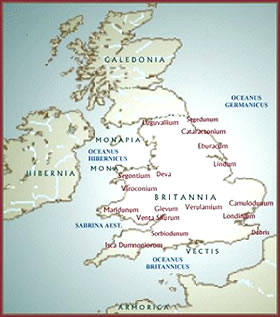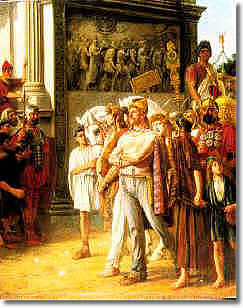- Charles Dickens.
- Chapter 1. Ancient England and the romans.
- Глава 1. Римляни в стародавній Англії.
- Caractacus. Led through Rome in chains, Painting by Thomas Davidson
Babyland.ru: англійська мова для дітей та малюків
Життя хороше!
Наші партнери та друзі 
Charles Dickens.

Chapter 1.
Ancient England and the romans.
IF you look at a Map of the World, you will see, in the left-hand upper corner of the Eastern Hemisphere, two Islands lying in the sea. They are England and Scotland, and Ireland. England and Scotland form the greater part of these Islands. Ireland is the next in size. The little neighbouring islands, which are so small upon the Map as to be mere dots, are chiefly little bits of Scotland, - broken off, I dare say, in the course of a great length of time, by the power of the restless water .
Глава 1.
Римляни в стародавній Англії.
Дивлячись на карту світу, ви легко знайдете в лівому верхньому кутку Східної півкулі два острови, оточених морем. Це Англія з Шотландією і Ірландія. Найбільший острів займають Англія і Шотландія, той, що поменьше- Ірландія. Там же ви побачите безліч островков- можна сказати, що це шматочки Шотландії, що відкололися від неї, під впливом не знає відпочинку води. In the old days, long ago, the sea roared round them, just as it roars now. But the sea was not alive, then, with great ships and brave sailors, sailing to and from all parts of the world. The winds and waves brought no adventurers to the islands, and the savage Islanders knew nothing of the rest of the world, and the rest of the world knew nothing of them. У давні часи море ревіло навколо цих островів точно так же, як і зараз. Але тоді його НЕ борознили великі кораблі з усіх частин світу. Вітри і хвилі не заносили сюди шукачів пригод, і дикі остров'яни нічого не знали про решту світу, а решта світу нічого не знав про них. It is supposed that the Phoenicians came in ships to these Islands, and found that they produced tin and lead- both very useful things, produced upon the sea-coast. The most celebrated tin mines in Cornwall are, still, close to the sea. One of them is hollowed out underneath the ocean; and the miners say, that in stormy weather they can hear the noise of the waves thundering above their heads. Вважають, що першими до островів припливли стародавні фінікійці; зійшли на берег і виявили, що на узбережжі видобуваються олово і свинець- метали вельми корисні. Олов'яні рудники Корнуолла і зараз знаходяться недалеко від океану, а одна з шахт- прямо під дном морським, і рудокопи кажуть, що в бурю вони чують гуркіт хвиль над своєю головою. The Phoenicians traded with the Islanders for these metals, and gave the Islanders some other things in exchange. The Islanders were poor savages, going almost naked, or only dressed in the rough skins of beasts. But the Phoenicians, sailing over to the opposite coasts of France and Belgium, and saying to the people there, 'We have been to those white cliffs across the water, which you can see in fine weather, and from that country, which is called BRITAIN, we bring this tin and lead, 'tempted some of the French and Belgians to come over also. These people settled themselves on the south coast of England, which is now called Kent; and, although they were a rough people too, they taught the savage Britons some useful arts, and improved that part of the Islands. It is probable that other people came over from Spain to Ireland, and settled there. Thus strangers became mixed with the Islanders, and the savage Britons grew into a wild, bold people; almost savage, still, but hardy, brave and strong. Фінікійці почали торгувати з островітянамі- обмінювати свої товари на олово і свинець. Остров'яни були бідними дікарямі- ходили вони майже голими або в необроблених звірячих шкурах. Фінікійці, повертаючись до берегів нинішньої Франції і Бельгії, розповідали тамтешнім жителям:
-Ми побували у білих круч, які видно звідси в ясну погоду. З цієї країни, зветься вона Британією, ми і привезли олово і свинець.
І у багатьох виникало бажання самим відправитися туди.
Вони обгрунтовувалися на південному узбережжі Англії, там, де зараз графство Кент, і хоча також були майже дикунами, все ж могли навчити бриттів деяким корисним ремеслам, тим самим сприяючи розвитку цієї частини Британії.
В Ірландії ж, досить імовірно, висадилися вихідці з Іспанії.
Чуземци змішувалися з місцевими жителями, і мало-помалу стародавні бритти стали сміливим, зухвалим племенем- все ще досить диким, але загартованим, хоробрим і сміливим. The whole country was covered with forests and swamps. The greater part of it was misty and cold. There were no roads, bridges, streets nor houses. A town was only a collection of straw-covered huts, hidden in a thick wood, with a ditch all round, and a low wall, made of mud, or the trunks of trees placed one upon another. The people planted little or no corn, but lived upon the flesh of their flocks and cattle. They made no coins, but used metal rings for money. They were clever in basket-work, and they could make a coarse kind of cloth, and some very bad earthenware. But in building fortresses they were much more clever. They made boats of basket-work, covered with the skins of animals, but seldom, if ever, ventured far from the shore. Країну покривали ліси і болота, велика її частина була туманна і холодна. Не було ні доріг, ні мостів, ні міських вулиць, ні будинків. У лісах тулилися маленькі селища з критих соломою хатин, оточені ровом і невисокою глинобитною стіною або дерев'яної огорожею.
Хліба бритти майже не сіяли, харчувалися м'ясом корів і овець, яких розводили досить багато. Монет у них не було, і грошима служили залізні кільця.
Бритти були непоганими кошикарі, вміли ткати грубе сукно і обпалювати незграбні глиняні судини. Зате вони досягли успіху в будівництві фортець. Робили вони і човни- сплітали каркас із прутів і обтягували звіриними шкурами. Правда, далеко в море вони на них не ходили. They made swords, of copper mixed with tin, but, these swords were so soft that a heavy blow would bend one. They made light shields, short pointed daggers, and spears - which they jerked back after they had thrown them at an enemy, by a long strip of leather fastened to the stem. The butt-end was a rattle, to frighten an enemy's horse. The ancient Britons, being divided into as many as thirty or forty tribes, each commanded by its own little king, were constantly fighting with one another, and they always fought with these weapons. З сплаву міді та олова бритти виготовляли мечі, але досить мягкіе- від сильних ударів вони гнулися. Виготовляли бритти легкі щити і короткі загострені кинджали, а також дротики, до яких прив'язувалися довгі ремінці: метнувши спис на ворога, воїн за ремінець висмикував його і знову метал. Товстий кінець дротика забезпечувався брязкальцем, щоб лякати ворожих коней.
Стародавні бритти поділялися на тридцять, а то й сорок племен на чолі з князем, і вони постійно воювали один з одним за допомогою цієї зброї. They were very fond of horses. The standard of Kent was the picture of a white horse. They could break them in and manage them wonderfully well. Indeed, the horses, though they were rather small, were so well taught in those days, that they can scarcely be said to have improved since; though the men are so much wiser. They obeyed every command; and would stand still by themselves, in all the din and noise of battle, while their masters went to fight on foot. The Britons could not have succeeded in their most remarkable art, without the aid of these sensible and trusty animals. The art I mean, is the construction and management of war-chariots or cars, for which they have ever been celebrated in history. Each of the best sort of these chariots, not quite breast high in front, and open at the back, contained one man to drive, and two or three others to fight - all standing up. The horses who drew them were so well trained, that they would tear, at full gallop, over the most stony ways, and even through the woods; dashing down their masters 'enemies beneath their hoofs, and cutting them to pieces with the blades of swords, or scythes, which were fastened to the wheels, and stretched out beyond the car on each side, for that cruel purpose. In a moment, while at full speed, the horses would stop, at the driver's command. The men within would leap out, deal blows about them with their swords, leap on the horses, on the pole, spring back into the chariots anyhow; and, as soon as they were safe, the horses tore away again. Бритти дуже любили коней. Гербом Кента було зображення білої лошаді.Оні прекрасно об'їжджали коней і вміли з ними звертатися. Їх низькорослі коні в ті часи були так чудово навчені, що навряд чи чимось усатупілі б нинішнім, хоча люди з тих пір і стали значно розумніші.
Коні виконували будь-яку команду і в розпал жорстокої битви стояли спокійно і чекали, поки їх господарі билися пішими. Навряд чи бритти так досягли успіху б в самому знаменитому зі своїх мистецтв, не будь у них таких чудових помічників. Я говорю про будівництво бойових колісниць і умінні управляти ними, ніж бритти і прославилися в історії. Кожна колісниця, відкрита ззаду і прикривала візника по груди, вміщала одного візника і двох-трьох воїнів- всі вони стояли. Упряжні коні були так добре навчені, що галопом мчали по кам'янистих дорогах або по лісі, перекидаючи ворогів, топчучи їх копитами або кришу лезами мечів і косами, які для цієї мети прикріплялися до коліс, виступаючи з боків колісниці. Але навіть на всьому скаку коня негайно зупинялися по команді візника. Тоді воїни вистрибували з колісниці, рубали ворога мечами, потім схоплювалися на коней, на дишло, звідти-в колісницю і мчали далі. The Britons had a strange and terrible religion, called the Religion of the Druids. It seems to have been brought over, in very early times, from the opposite country of France, anciently called Gaul, and to have mixed up the worship of the Serpent, and of the Sun and Moon, with the worship of some of the Heathen Gods and Goddesses. Its ceremonies were kept secret by the priests, the Druids, who pretended to be enchanters.Their ceremonies included the sacrifice of human victims, the torture of some suspected criminals, and, on occasions the burning alive, in immense wicker cages, of a number of men and animals together. The Druid Priests had some kind of veneration for the Oak. They met in dark woods, which they called Sacred Groves; and there they instructed, in their mysterious arts, young men who came to them as pupils. У бриттів була дивна релігія, називаемвя релігією друїдів. Мабуть, її занесли на острів в ще давніші часи з берегів Франції, і вона змішалася з місцевими верованіямі- до поклоніння Змію, Сонцю і Місяцю додалося поклоніння іншим язичницьким богам і богиням.
Всі обряди зберігалися жерцями в найсуворішій тайне- вони видавали себе за чаклунів. Обряди включали людські жертвоприношення, тортури запідозрених у злочині, а іноді і спалення живцем людей і тварин у величезних, сплетених із прутів клітинах. Друїди поклонялися дубу, вважаючи це дерево священним. Збиралися друїди завжди в лісових хащах, які називалися священними гаями. Там же вони присвячували в свої таємниці юнаків, своїх учнів. These Druids built great Temples and altars, open to the sky, fragments of some of which are yet remaining. Stonehenge is the most extraordinary of these. Three curious stones in Kent form another. We know, from examination of the great blocks, that they could not have been raised without the aid of some ingenious machines, which are common now, but which the ancient Britons certainly did not use. I should not wonder if the Druids kept the people out of sight while they made these buildings, and then pretended that they built them by magic. Друїди будували величезні вівтарі під відкритим небом- залишки деяких збереглися до цих пір. Найбільш примітний з них Стоунхендж. Інший вівтар, в Кенті, складний з трьох дивних каменів.
Оглядаючи ці величезні брили, ми переконуємося, що підняти їх можна було тільки за допомогою якихось хитромудрих машин- тепер таких машин багато, але древні британці ними, безумовно, не користувалися. І я б не здивувався, дізнавшись, що друїди не допускали непосвячених на місце споруди, щоб потім оголосити, ніби споруди ці споруджені ними за допомогою магії.
Such was the improved condition of the ancient Britons, fifty-five years before the birth of Our Saviour, when the Romans, under Julius Caesar, were masters of all the rest of the world.
Caesar had then just conquered Gaul; and hearing, in Gaul, a good deal about the opposite Island with the white cliffs, and about the bravery of the Britons who inhabited it, he resolved to conquer Britain next. Ось так виглядали справи в Британії за 55 років до народження Спасителя нашого, Ісуса Христа, коли римляни під проводом Юлія Цезаря стали володарями всього іншого світу.
Цезар підкорив Галлію, і почувши розповіді про острів з білими скелями по ту сторону протоки, а також про хоробрість населяють його бриттів, тут же вирішив завоювати Британію. So, Julius Caesar came sailing over eighty vessels and twelve thousand men. And he came from the French coast between Calais and Boulogne, 'because thence was the shortest passage into Britain;' for the same reason as our steam-boats now take the same track, every day. He expected to conquer Britain easily: but it was not such easy work as he supposed - for the Britons fought bravely. However, for once that the bold Britons beat him, he beat them twice; still he was glad to accept their proposals of peace and go away. І ось Цезар з'явився в Британії на вісімдесяти кораблях з дванадцятитисячної військом. Він відплив від французького узбережжя між Кале і Булонь, тому що "звідти найближче до Британії." А в наші дні пароплави повторюють цей шлях кожен день.
Цезар вважав, що швидко підкорить бриттів. Однак він прорахувався: бритти билися відчайдушно і хоробро. Правда, на кожну перемогу бриттів Цезар відповідав двома своїми, але все ж з радістю прийняв їх пропозиції про світ і поплив геть. But, in the next year he came back; this time, with eight hundred vessels and thirty thousand men. The British tribes chose, as their general-in-chief, a Briton, whom the Romans in their Latin language called CASSIVELLAUNUS, but whose British name is supposed to have been CASWALLON. A brave general he was, and well he and his soldiers fought the Roman army! So well, that whenever in that war the Roman soldiers heard the rattle of the rapid British chariots, they trembled in their hearts. Several battles were fought. Brave CASSIVELLAUNUS had the worst of it, on the whole; though he and his men always fought like lions. The British chiefs were always quarrelling with him, and with one another, so he gave up, and proposed peace. Caesar was very glad to grant peace easily, and to go away again with all his remaining ships and men. На початку наступного року він вернулся- на цей раз на вісімсот кораблях і з тридцятьма тисячами солдатів.
Племена бриттів обрали своїм головнокомандувачем Кассівеллана. Він був відважним полководцем, його воїни так хоробро билися з римлянами, що варто було тим почувши гуркіт бойових колісниць бриттів, як їх серця починали тремтіти.
У кількох битвах хоробрий Кассівеллан зазнав поразки, хоча бритти і билися як леви. До того ж їх вожді постійно сварилися між собою і з Кассівелланом, і тому він вирішив запропонувати римлянам мир.
Цезар зрадів і разом з військом, на той час значно поріділим, залишив острів. Nearly a hundred years passed on, and all that time, there was peace in Britain. The Britons improved their towns and mode of life: became more civilised, travelled, and learnt a great deal from the Gauls and Romans. At last, the Roman Emperor, Claudius, sent a mighty force to subdue the Island, and shortly afterwards arrived himself. They did little, and another general came. Some of the British Chiefs submitted; others resolved to fight to the death. Of these, the bravest was CARACTACUS, who with his army, gave battle to the Romans among the mountains of North Wales. 'This day,' said he to his soldiers, 'decides the fate of Britain! Your liberty, or your eternal slavery, dates from this hour. Remember your brave ancestors, who drove the great Caesar himself across the sea! ' Hearing these words, his men rushed upon the Romans. But the strong Roman swords and armour were too much for the weaker British weapons in close conflict. The Britons lost the day. The wife and daughter of the brave CARACTACUS were taken prisoners; his brothers delivered themselves up; he himself was betrayed into the hands of the Romans and they carried him and all his family in triumph to Rome.
Минуло майже сто років, і весь цей час в Британії панував мир. Розвивалися ремесла, розширювалися і зміцнювалися міста, бритти подорожували і багато чому навчилися у галлів і римлян. Потім римський імператор Клавдій відправив сильне військо завоювати острів, а потім прибув туди і сам.
Домоглися римляни небагато чого. Але приїхав новий полководець, і деякі вожді бриттів підкорилися. Однак інші вирішили боротися до останнього. Лицар серед них, Карактак, дав римлянам бій в горах Північного Уельсу.
-Цей день, - сказав він воїнам, - вирішить долю Британії! Ви відстоїте свою свободу, або з нього почнеться вічне рабство. Згадайте ваших доблесних предків, які змусили самого великого Цезаря відступити за море.
Воїни, одухотворені його словами, обрушилися на римлян, але зброю їх виявилося занадто слабким проти міцних римських мечів і панцирів, і битва була програна. Дружину і дочку хороброго Карактака взяли в полон, його брати здалися самі, він же був відданий і потрапив в руки римлян. Він і його сім'я йшли в тріумфальної процесії, на чолі якої переможець в'їхав в Рим.

Caractacus. Led through Rome in chains, Painting by Thomas Davidson
But a great man will be great in misfortune, great in prison, great in chains. His noble air so touched the Roman people, who thronged to see him, that he and his family were restorted to freedom. No one knows whether he died in Rome or returned to his own country. Але велика людина великий завжди-і в нещастя, і в тюрмі, і в кайданах. Шляхетний вид Карактака торкнув римлян, що товпилися, щоб подивитися на бранця, і йому з родиною була повернута свобода. Ніхто, втім не знає, чи закінчив він свої дні в Римі або ж повернувся на Батьківщину. продовження




